Electronics surround us in our daily lives. From smartphones to TVs, electronics are part of our daily living and Texas is no different from the rest of the US.
Moreover, electronic devices, gadgets, and equipment are evolving at a massive pace, which makes devices old and outdated quickly and new models take their place.
So, where do the old and end-of-use devices go? Unfortunately, even with strict Texas e-waste recycling laws, a large sum of it is thrown out and not disposed of appropriately. As a result, it accumulates as toxic waste.
A live count indicates that more than 24 million tons of electronic waste have been squandered, dumped, or thrown out in 2024 so far. The same source claims that e-waste makes up 70% of the toxic waste, with only 12.5% of e-waste going into recycling.
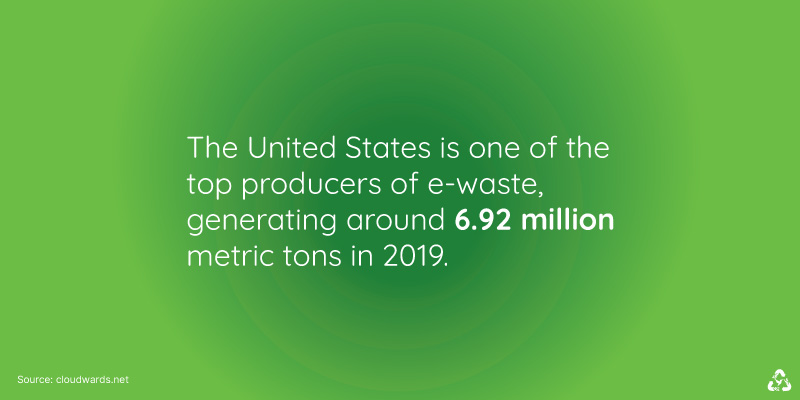
First of all, it is the duty of every one of us to take care of our beautiful Earth. To help you in this regard, we have put together this article. Below, we will discuss the TX E-waste recycling laws, rules, and regulations, and educate you on the best practices for safe e-waste disposal and recycling in Texas.
Responsible Electronics Recycling in Texas
Carried out by The Texas Commission on Environmental Quality (TCEQ), The Program Report on Texas Recycles Computers and Televisions study calculated the amount of recycled computers and television equipment in 2023. It showed that:
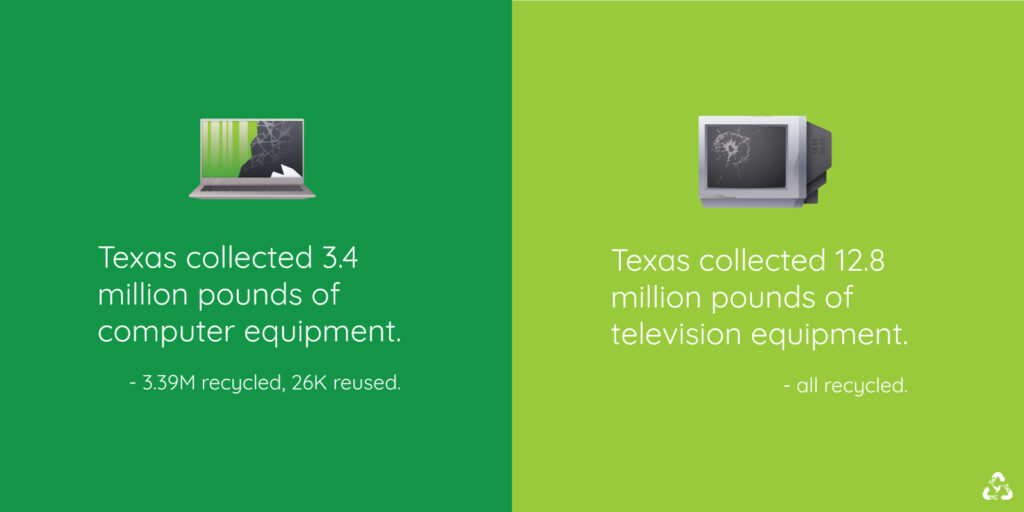
- The total combined amount of computer equipment collected was 3.4 million pounds. Out of this, 3.39 million pounds were recycled and over 26 thousand pounds were reused.
- The total combined amount of television equipment collected was over 12.8 million pounds. Out of this, all 12.8 million pounds were recycled and none was reused.
It is extremely crucial to properly recycle unwanted devices or electronic items at the end of their lives. The management must follow a proper manner to prevent health and environmental harm.
Moreover, these devices and equipment contain several useful materials that can be recycled for use in the manufacturing of new products. For example, steel, aluminum, plastic, copper, and other useful metals. E-waste recycling companies can separate these materials and return them to the industry or company.
The recyclable electronic devices include laptops, hard drives, keyboards, mouse, LCD/CRT monitors, TVs, and inkjet/laser jet/all-in-one printers.
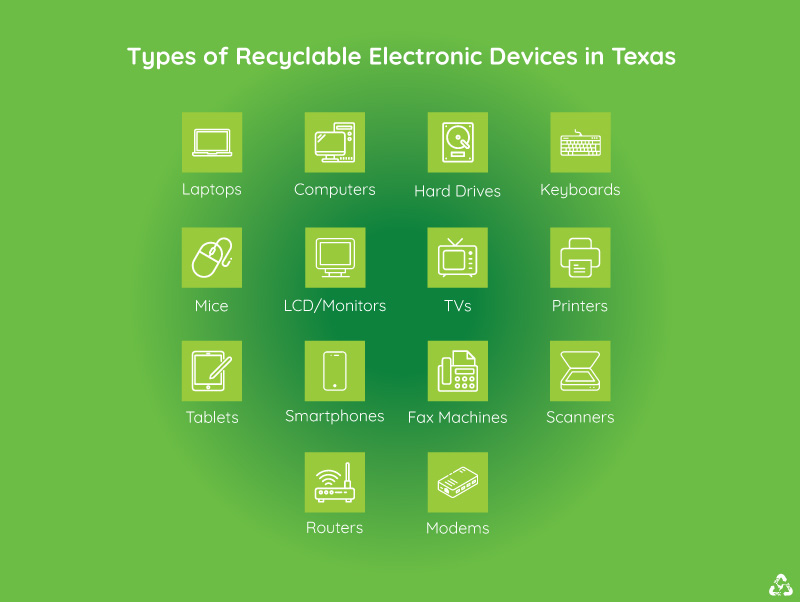
The TCEQ calculated 23 manufacturers’ recycling rate to be 11.61% for the 2024 market share allocation. The Texan government and manufacturers are working hard to sort out the e-waste problem, and we should all help too.
Texas State E-Waste Legislation in the US
The State E-Waste Legislation in the US has passed two separate legislation bodies, namely Advanced Recycling Fee (ARF) and Producer Responsibility. The state of Texas uses the Producer Responsibility approach which governs two programs for efficient recycling.
The two programs are:
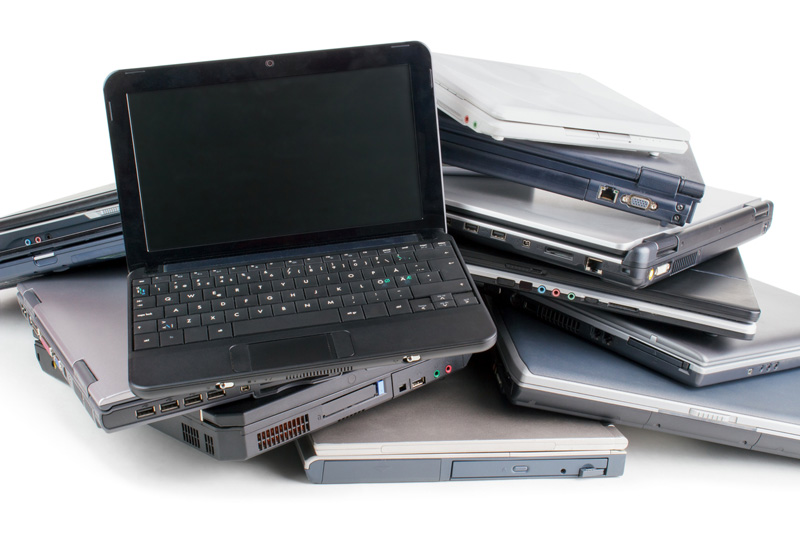
Image Source: iStock/Arijuhani
- Computer Equipment Recycling Program — which focuses on computer equipment manufacturers. It requires manufacturers to implement a return policy and program for their computer items and equipment. This program is set up for household consumers in Texas.
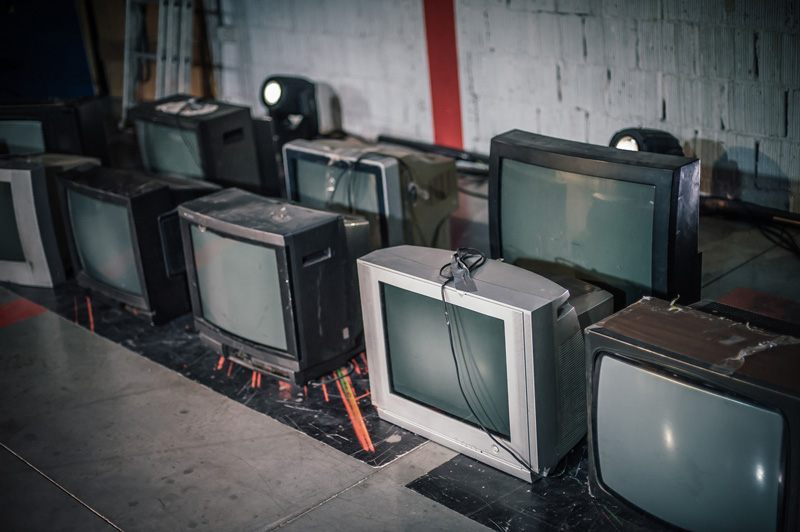
Image Source: iStock/guruXOOX
- Television Equipment Recycling Program — which focuses on television manufacturers. It requires covered television equipment (CTE) manufacturers to implement a takeback program to collect, recycle what is reusable, and properly dispose of the rest.
Consumers can visit the Texas Recycles Computers Program page for free computer recycling. Consumers must find the brand of computer in the list present on the page, and contact the manufacturer directly.
Similarly, consumers can visit the Texas Recycles TVs program page to learn more about the program, and the retailer, manufacturer, and recycler requirements.
Also, it includes instructions on how to recycle your TV, along with a list of brands and their manufacturers. Consumers must visit the relevant manufacturer page and check if they accept the product or if any other manufacturer programs do so.
Should you securely recycle, upgrade, or donate your electronics in Texas?
Although the Texas IT disposal services and community events are ideal for proper and safe e-waste disposal, consumers can also choose to donate their products.
Electronic items, devices, gadgets, and products contain valuable resources and rare materials in E-waste. For example, plastic, metals, glass, copper, and some others. All of these are recyclable and reusable when manufacturing new products.
However, before sending your beloved computer or electronic device to recycling companies, consider upgrading first and if that’s not an option, choose someone to donate your old laptops.
Almost every personal computer is upgradable. You can add additional RAM, upgrade CPU, change GPU, or any other component. It will limit the e-waste and help you save money. Yet, no television is upgradable and the only option is to either dispose of it or donate it.
However, if upgrading is completely out of the sentence, consider donating the product. There are many students, communities, childcare centers, old age homes, or nonprofits that may put these products to good use.
It will reduce the amount of e-waste, help someone in need, and promote such thinking among others.
Conclusion
The different Texas e-waste recycling laws, rules, and regulations govern the proper disposal and recycling of electronic products. Although these laws may include some strict policies, they are for the safety of Texas residents and communities.
Electronic waste is a global problem that is rising with each passing day. Only proper disposal and recycling methods can overcome it and reduce its harmful impacts on Earth.
The Texas E-waste Recycling programs and regulations are present to ensure this, and we must all fully comply with them.


Leave a Reply